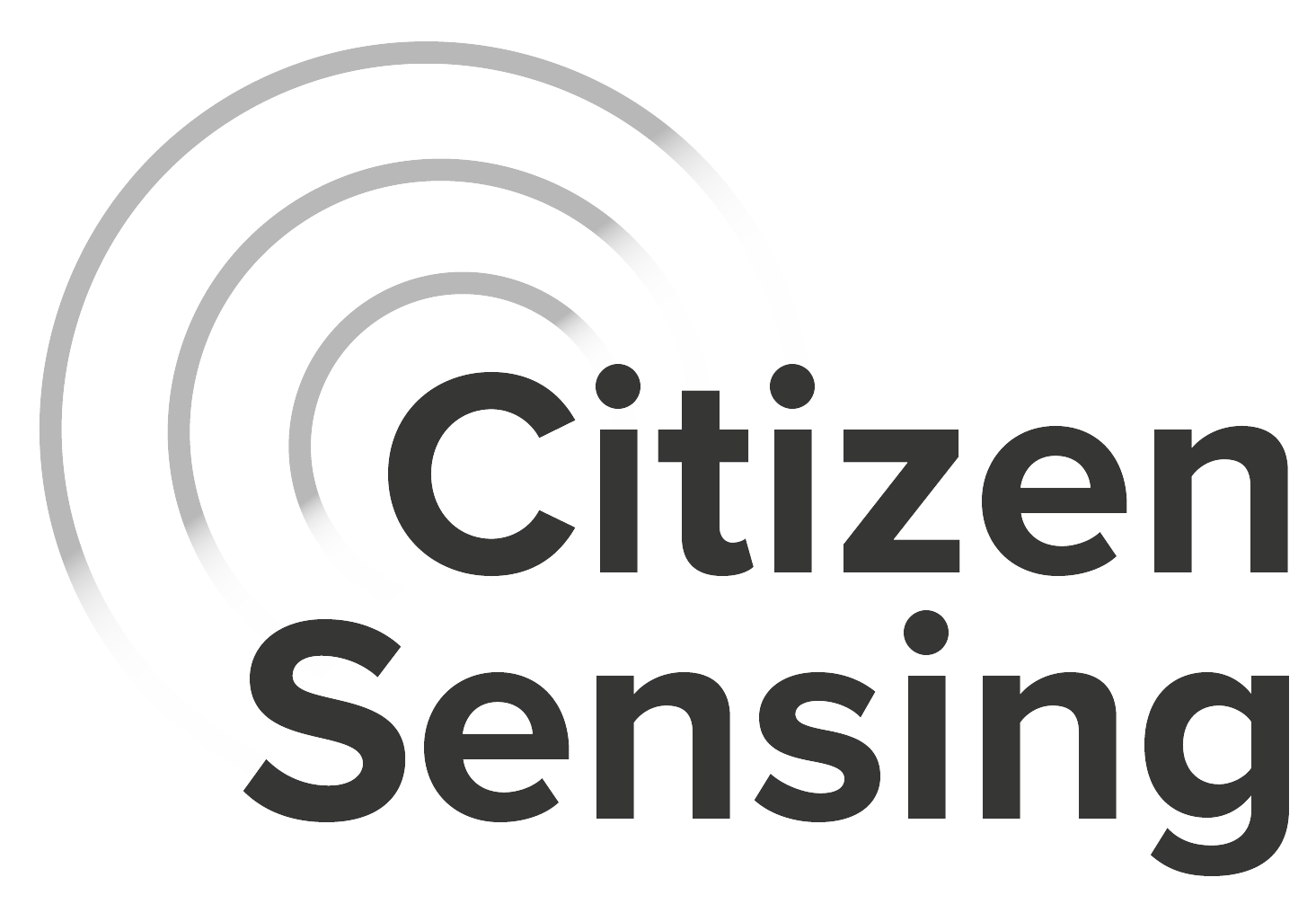


 This project is funded by JPI Climate and co-funded by the European
Union
This project is funded by JPI Climate and co-funded by the European
UnionParticular research funding agencies: FORMAS (Sweden), RCN (Norway), NWO (The Netherlands), and FCT (Portugal)


 This project is funded by JPI Climate and co-funded by the European
Union
This project is funded by JPI Climate and co-funded by the European
UnionUrban citizens continually make a multitude of decisions related to climate-related risks e.g. extreme temperatures, precipitation, flooding, water and air pollution and their impacts and these are most often made without clear knowledge of locally specific conditions. With new technologies such as citizen sensing, there is an emerging opportunity for citizens to enhance urban resilience, both as providers of locally situated data (e.g. bacteria levels in drinking-water, infrastructure damage or ecological changes) and as receivers of specific recommendations of how to respond to climate-related challenges.
Lead Principle Investigator (LPI):
Tina-Simone Neset
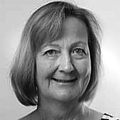
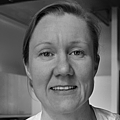
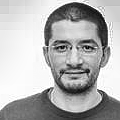
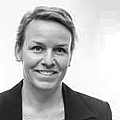
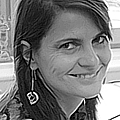
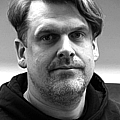
Principle Investigator (PI):
Jan Ketil Rød
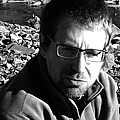
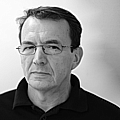
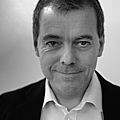
Principle Investigator (PI):
Sara Santos Cruz
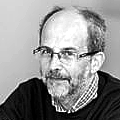
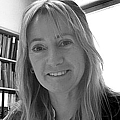
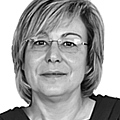
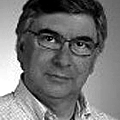

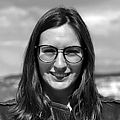
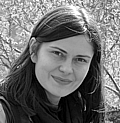
Principle Investigator (PI):
Maaike Maarse

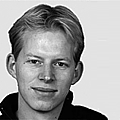
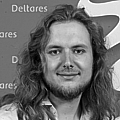
Trondheim
Norway
Inhabitants: 190 000, +23
000 including unregistered students that live in Trondheim
Responsible: Jan Ketil Rød
Description: annual mean temperature: 5.6°C, annual precipitation 890 mm.
Example of challenges: flooding impacts, decreased slope instability, increased
suspended dust from roads under low snowfall conditions. Possible climate indicators,
direct: heavy rainfall; indirect: runoff in deviating pathways, erosion,
discomfort/breathing problems from high dust levels.
Norrköping
Sweden
Inhabitants: 140
000
Responsible: Lotta Andersson
Description: annual mean temperature: 6.3°C, maximum daily temperature: 34.8°C, annual
precipitation: 507 mm, maximum daily precipitation: 130 mm.
Example of challenges: stormwater impacts on infrastructure and potable water quality
and heat waves. Possible climate indicators, direct: high temperatures and heavy
rainfall; indirect: experienced discomfort/illness, breathing problems from high dust
levels, mould or damage to buildings and infrastructure, water quality (bacteria
levels), water levels.
Porto
Portugal
Inhabitants: 237
000
Responsible: Sara Santos Cruz
Description: annual mean temperature: 15.2°C, annual precipitation: 1237 mm, ageing
population especially in old central buildings, high influx of tourists.
Example of challenges: urban flooding, a special emphasis, temperature extremes.
Possible climate indicators, direct: high temperatures (day and night) and frost days;
indirect: experienced discomfort and illnesses.
Rotterdam
The Netherlands
Inhabitants: 633
000
Responsible: Micheline Hounjet
Description: annual mean temperature: 10.4°C, average mean precipitation: 856 mm.
Example of challenges: impacts of heavy rain events on critical infrastructures and
society.
Next to the physical impacts of heavy rainfall events, we investigate the
mind-set of citizens having to deal with these impacts. There are many practical
solutions that citizens can do themselves to minimise the impact of heavy rainfall in
their neighbourhood or to deal with the event while it is happening. CitizenSensing
not only uses the experience of these citizens with rainfall events to learn more about
the impacts and how citizens deal with those, but also measures if mind-sets might
change when citizens learn about practical approaches from the other 3 cities in
CitizenSensing. For this purpose there is not only a focus on heavy rainfall
events, but we use extreme high temperatures as well.
Engage through the CitizenSensing app
On Christmas Eve 2020, the CitizenSensing project was featured as a news item on the Swedish Television (SVT, Rapport, the Swedish public service television company).
The picture features LiU researcher Jacob Wikner, explaining the sensor system employed in Norrköping to the journalist.
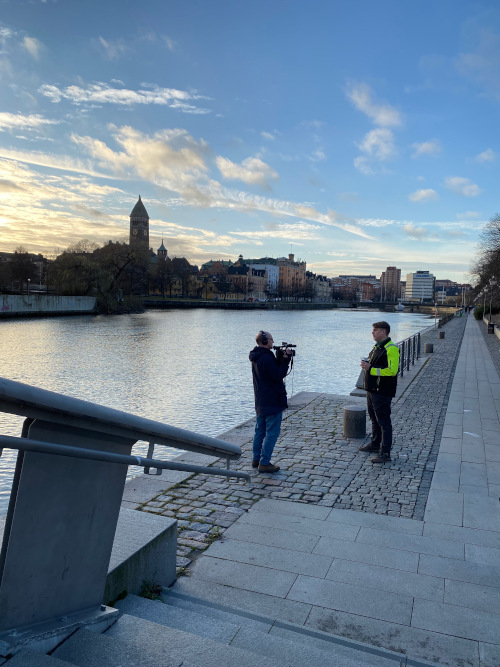
The third campaign was organized in Trondheim in autumn 2020. More than a hundred of undergraduate students participated in the campaign. They used the CitizenSensing web application to report on their observations of weather-related events. Moreover, they were using the prototype of our WayFinder tool that is to support pedestrians in avoiding exposed areas. The participants provided us with their feedback that will help us to further develop the tool.
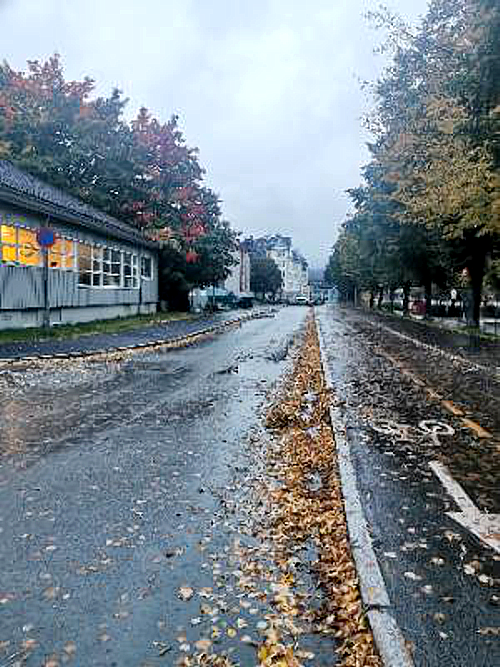
Carlo Navarra presented research results from the CitizenSensing project on two approaches for visually exploring climate-related data collected at the workshop "Visualization in Environmental Sciences 2020" (EnvirVis 2020) on May 25 2020. EnvirVis is a co-located event of EuroVis 2020 and invites both contributions in the field of visualization and visual data integration with a broad application area in environmental research.
In the talk "Visual Exploration of Climate-Related Volunteered Geographic Information", Carlo Navarra presented two approaches for visually exploring climate-related data collected within our CitizenSensing research project. The visual exploration approaches discussed are: a web portal enabling users to gain a low-level overview of the collected data on a map, and a visual analysis tool facilitating in-depth visual data exploration in search of spatio-temporal patterns.
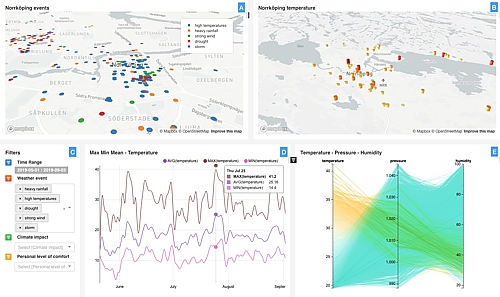
Sara Cruz presented the Citizen Sensing Project at the Stepping Out – Civil Engineering on DisplayConference From Planning to City Management, on the 3rd December at Porto Innovation Hub. This initiative aims to present innovative research projects, not only to the municipality and other researchers, but especially to the public in general.
Other projects from CITTA (Research Centre for the Territory, Transports and Environment) were also presented in the conference chaired by Paulo Pinho. The city council Pedro Baganha was the invited keynote speaker.
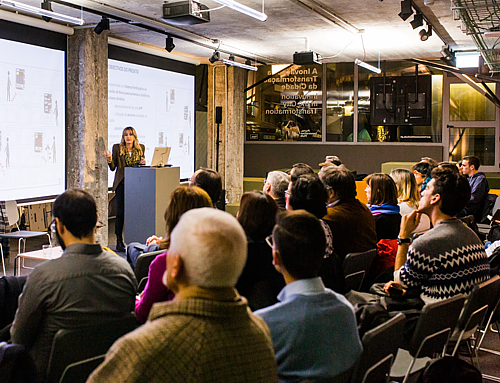
On November 20th, Asma Mehan from Citta UP gave a lecture as part of the "Accessibility Planning" Master Course at the Department of Civil and Environmental Engineering, Technische Universität München, Germany. She based on findings of our Citizen Sensing project to discuss whether citizen science can contribute to adaptive governance. She also demonstrated our CitizenSensing web app. As a result, immediately during the lecture, some Master's students tried out the app and reported their observations to the project's database.
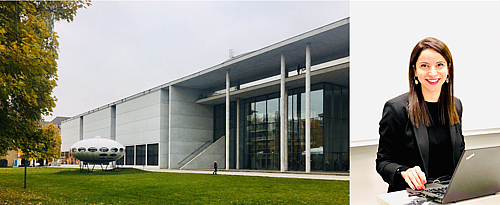
Asma Mehan and Paula Gonçalves (Porto team) presented the Citizen Sensing project at the 12th CITTA International Conference, September 19-20 in Porto, Portugal as part of the session "Social, environmental and economic dynamics" on September 20th. The presentation was titled "Citizen sensing - development of participatory risk management system." They talked about some concepts related to Citizen Social Science, Effective Climate Action and all the work developed in the project: workshops held and the campaigns developed in the 2 pilot cities (Porto and Norrkoping) as well as their results.
Asma was also moderator of a session entitled "Transformative planning processes" on September 19th.
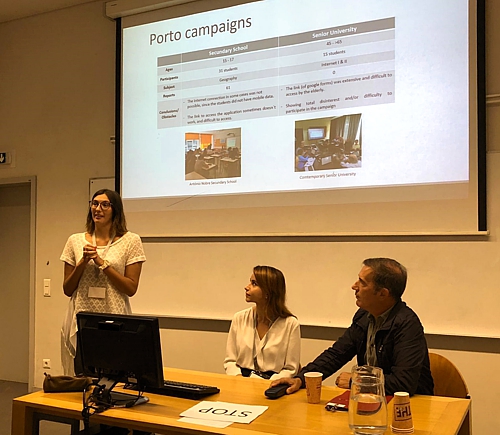
Jacob Wikner (LiU) and his team have installed several new sensors to support the CitizenSensing campaigns in Norrköping this summer!
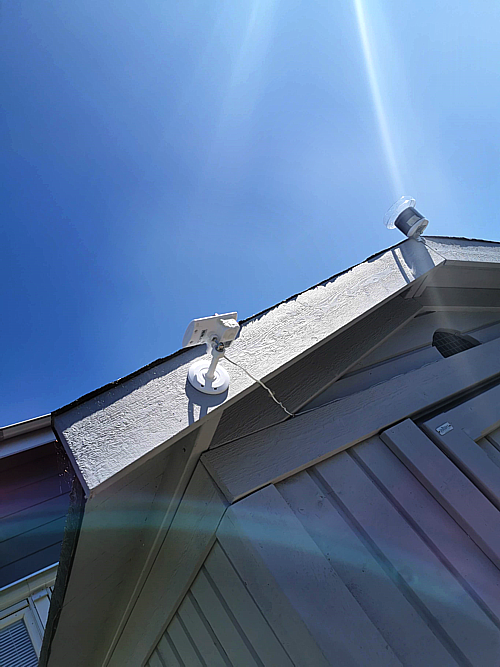
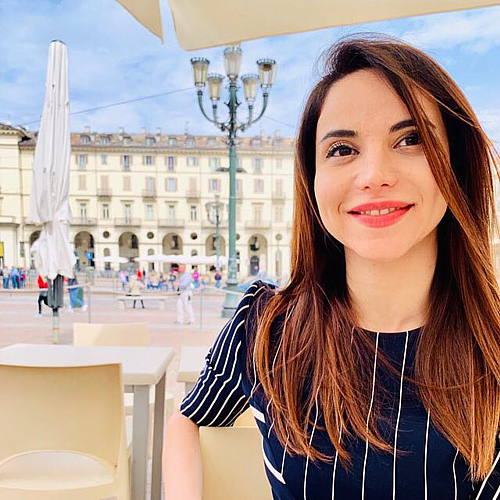
Tina-Simone Neset (LiU) presented the Citizen Sensing project at the 8th Nordic Geographers Meeting June 16 – 19 in Trondheim, Norway, as part of the session "Understanding climate change and informing climate action in the European Northern Periphery" on June 18th. In her talk "Citizen Engagement and knowledge co-production to increase urban climate resilience", she presented the main concepts of citizen science for urban climate resilience and demonstrated the prototype of the web app.
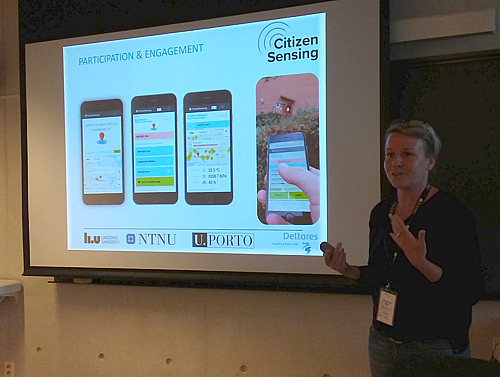
The Citizen Sensing Project was presented at three oral presentations, a poster, and a presentation at the Climate Europe Booth during the ECCA conference May 27 – 30 in Lisbon, Portugal.
Lotta Andersson (LiU/SMHI) gave a pitch presentation of the Citizen Sensing project at the JPI Climate Side Event ‘Climate services: state of affairs, relevance for users and the way forward’ on May 27th. Ana Monteiro (Porto University) presented her Poster 'Increasing Citizens' perception and awareness of climate risks: a case study in Porto' at the poster session on May 28th. Sara Santoz Cruz (Porto University) gave her presentation entitled: ‘Can Citizen Sensing Contribute to Adaptive Governance?’ as part of the Session on Experiences and lessons in multi-level governance of adaptation and risk management, and Tina Neset (LiU) presented the project in the session on Climate Services and Methods for Heat and Health in Urban Areas.
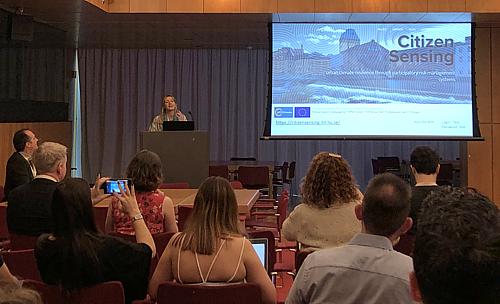
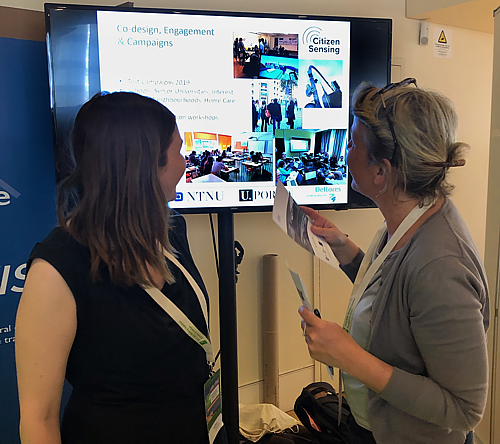
A meeting with 13 students of Senior University Contemporânea was held on 16th of May 2019. Professor Artur Santos, the head of Senior University Contemporânea, was responsible of the meeting.
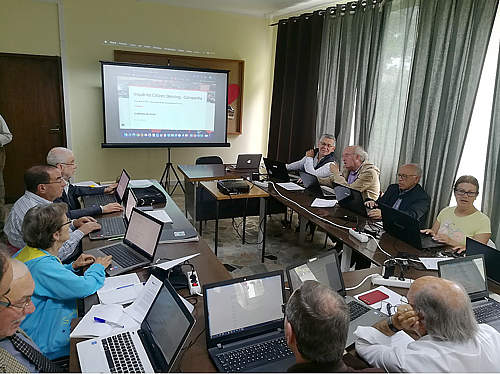
The first Campaign with high school students was launched in Norrköping. Anna Renholm, student at the Masters Program Science for Sustainable Development/LiU studied knowledge, awareness and engagement with the CitizenSensing app.
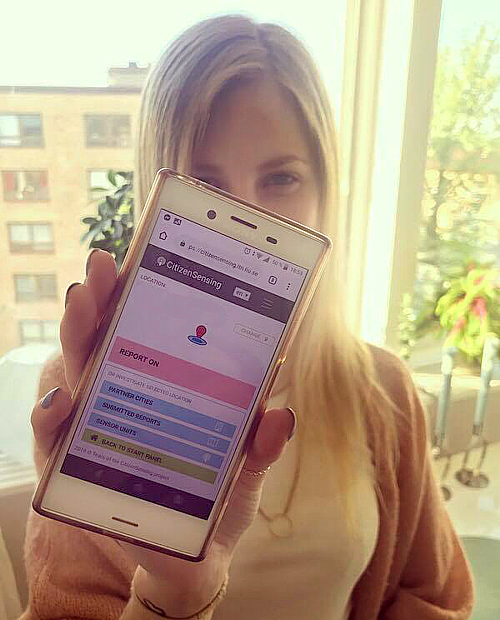
The first Campaign with high school students was launched in Porto. A total number of 31 students from two classes (18 and 15 students) attended two meetings. Licínia Balkeståhl was the school teacher responsible for the meetings.
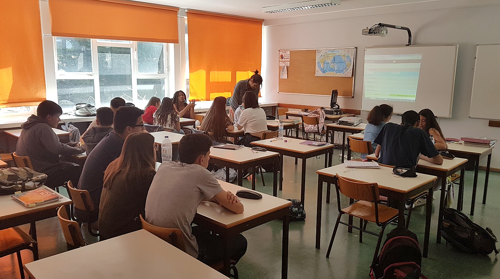
Citizen Sensing Researchers Filipa Malafaya (University of Porto) and Tomasz Opach (NTNU, LiU) presented the Citizen Sensing project and demonstrated the prototype of the web app that is to be part of the Participatory Risk Management System – the main deliverable of the project at the 5th Nordic Conference on Climate Change Adaptation (NoCCA). The presentation, which entailed a presentation of the project objectives, consortium and the four pilot cities, as well as a presentation of the main functionalities of the web application, was part of the conference session “Visualization and gaming – making adaptation real”, which was chaired by three further Citizen Sensing Researchers, Sirkku Juhola (Helsinki University), Lotta Andersson (SMHI) and Tina Neset (LiU).
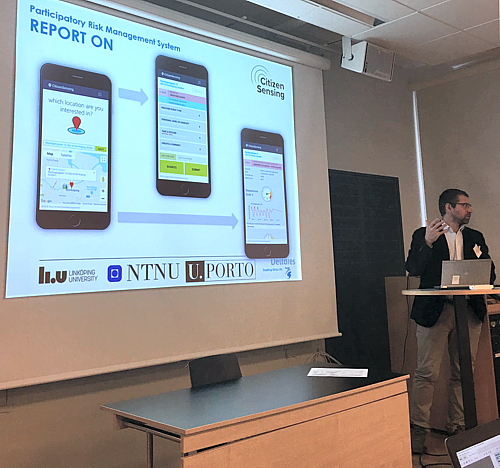
On the 22&23 October 2018, the Citizen Sensing consortium held their annual meeting at Linköping University, Campus Norrköping, Sweden. The program covered the reporting of the progress during year 1, the state of development of the web-application, results from early test sessions as well as the status of the sensor development. The consortium also designed a work plan for the second year and discussed central research and development related issues.
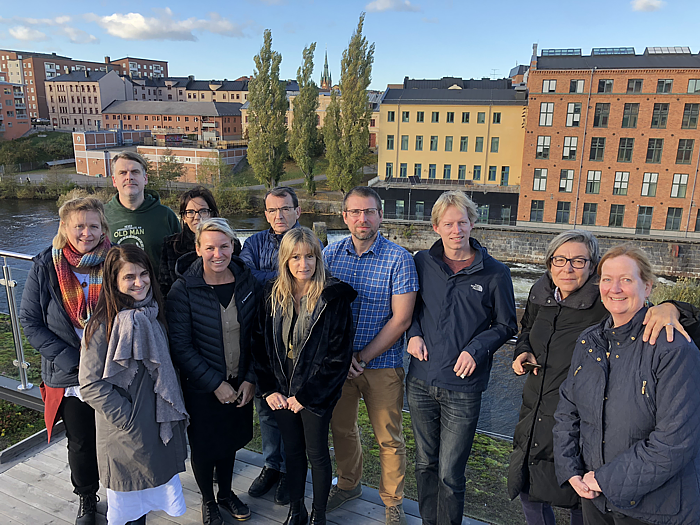
In July, Sara Cruz presented the Citizen Sensing project at the 2018 AESOP Congress - MAKING SPACE FOR HOPE, in Gothenburg, Sweden. The presentation, entitled “Citizen Sensing – Urban Climate Resilience through Participatory Risk Management Systems”, communicated the objectives of the project, the local strategies of climate change adaptation in the four cities and outcomes from the stakeholder workshops held to date. The perspectives of “Citizens as Providers” and “Citizens as Receivers” were presented as well as challenges related to the relevance and legitimacy of collected information, experiences and knowledge sharing and differentiated geographies.
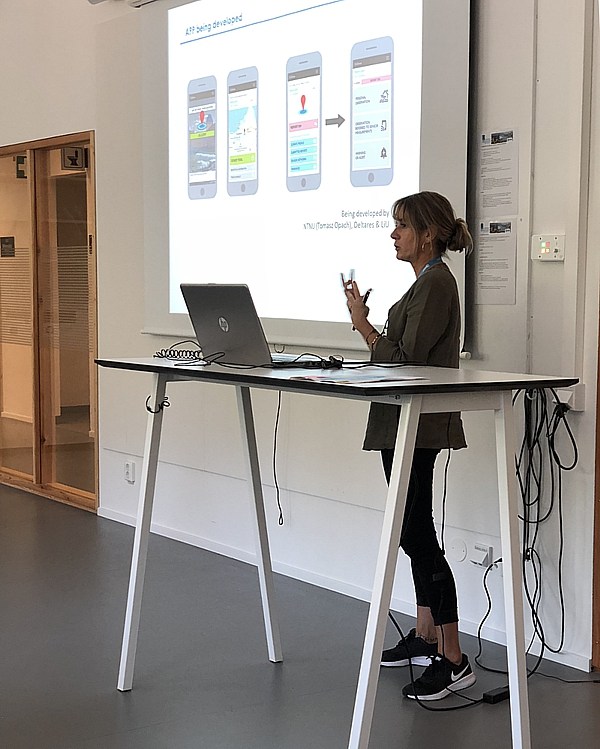
In July, Filipa Malafaya and Paula Gonçalves, of the Citizen Sensing Porto team met with representatives of the Civil Protection of Porto to discuss possibilities of cooperation within the project. They also considered different types of information that could be articulated with the Citizen Sensing App (extreme events, alerts, reaction measures, amongst others) as well as how to best communicate this information in a simple and friendly-user form to the app users.
Tina Neset, Lotta Andersson, Pontus Wallin and Julie Wilk of the Citizen Sensing Norrköping team met with teachers in various schools in Norrköping to discuss possibilities for engaging high school students to use the Citizen Sensing App as part of their learning of Sustainable Development. The dialogue concerned how their involvement could fit the school curriculum and course content of climate issues and effects and what learning components would be most useful for teachers and students. Suggestions included a lecture for the students about climate change and climate adaptation, hands-on sessions with a moderated role play based computerized climate adaptation game, participation in monitoring campaigns in Norrköping to record climate events and effects and a prize ceremony where participating students receive diplomas.
Jonathan Strandberg (Foto 1) and Andreas Claesson (Foto 2), students at the Electronics Engineering program at Linköping University have spent 10-12 weeks each on developing energy autonomous raspberry-pi-based sensor nodes for Bluetooth and Wifi communication. This particular node detects temperature, Sound, Wind, Analog interface, CO2, TVOCs, Video, moisture, rain. Jonathan has focused on the development of a power efficient platform. Andreas has focused on how to support the system with power and energy. He has studied solar power, battery, etc., that are most suitable for the Citizen Sensing project. The sensors will be tested during summer 2018 in the Norrköping pilot.
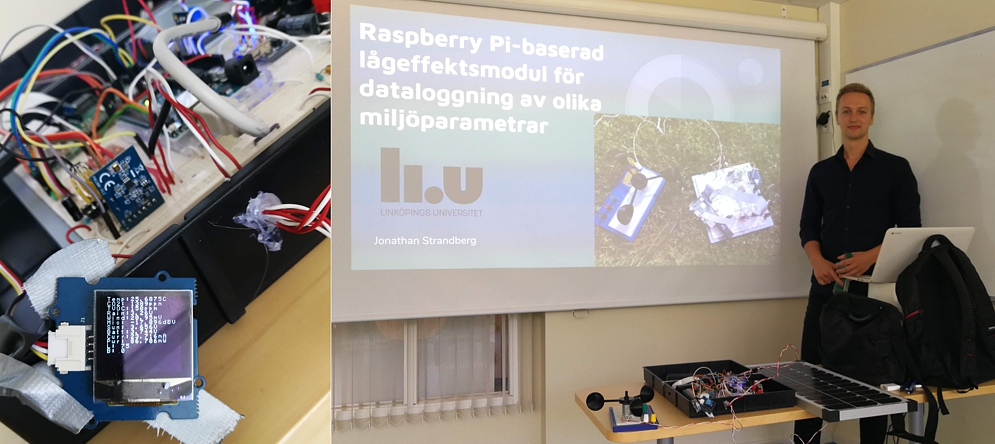
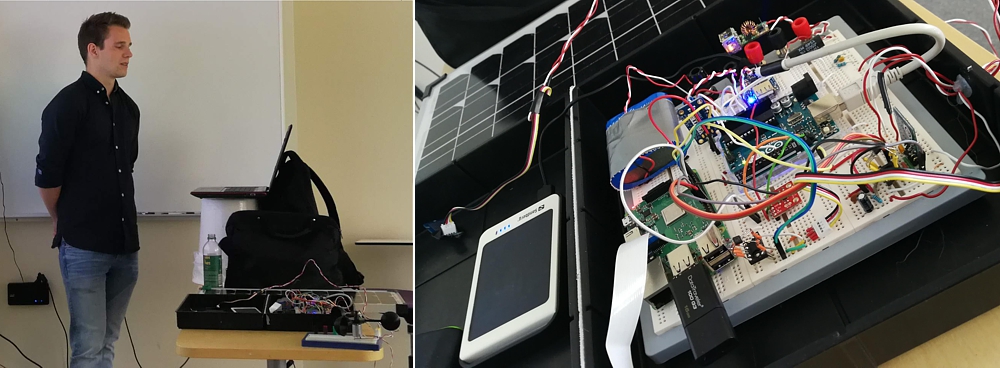
Two project workshops gathered politicians, Porto University professors and researchers, journalists, engineers, architects and representatives of Porto Municipality, the North Regional Development Commission (CCDR-N), Civil Protection of Porto, Porto Digital (Municipality), Quercus (an environmental NGO), Porto Metropolitan Area (AMP), North Health Directorate and INEG. At the first workshop in December 2017, the Metropolitan Plan for Adaptation to Climate Change was presented and participants discussed different perspectives, priorities and degrees of risk. At the second workshop in March of this year, the Citizen Sensing project was presented and discussed. Participants offered feedback from their experiences from similar projects using sensors and apps and on the vulnerabilities of different places and groups. As good communication is the most important feature in motivation, they highlighted the importance of well-defined strategies of dissemination and participation. They additionally suggested that the developed app be user friendly, attractive and simple to use but also contain exclusive information and, in some way, reward the user.
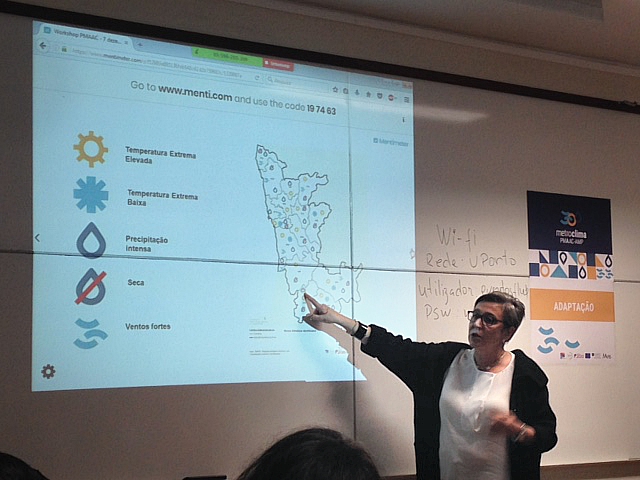
The Citizen Sensing team in Norrköping joined the city’s Climate Adaptation Group for the second time this week. Three interest areas were discussed in more detail by the gathered experts: heat, intensive rainfall and sensitive ecosystems. Specific parameters that could be monitored with apps and/or sensors were identified as well as citizen groups that might have interest in joining the measurement campaigns.
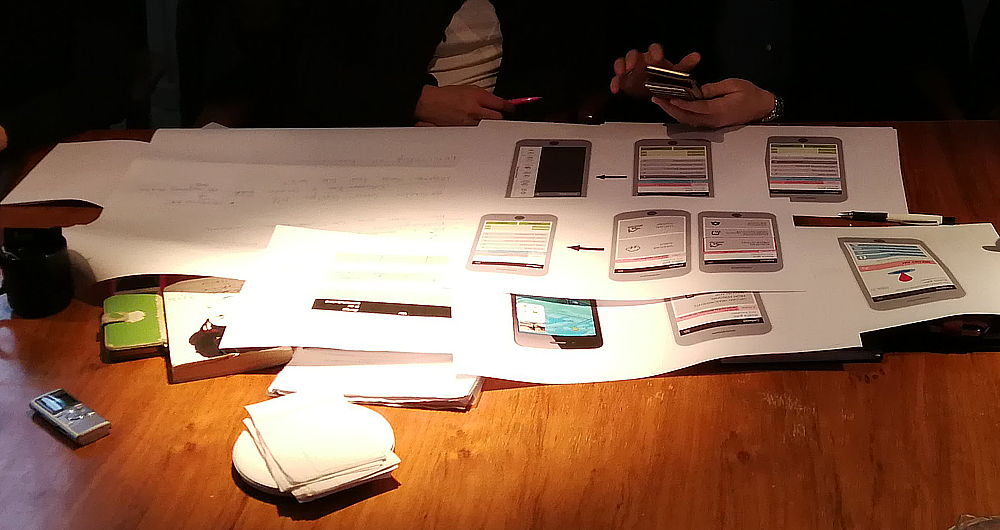
The official ERA4CS kick off in Brussels, Belgium.
LPI Tina-Simone Neset (LiU) participates in the official program kick-off in
Brussels...
 The first
stakeholder consultation with the Norrköping climate adaptation group has been
recently organised in Norrköping...
The first
stakeholder consultation with the Norrköping climate adaptation group has been
recently organised in Norrköping...
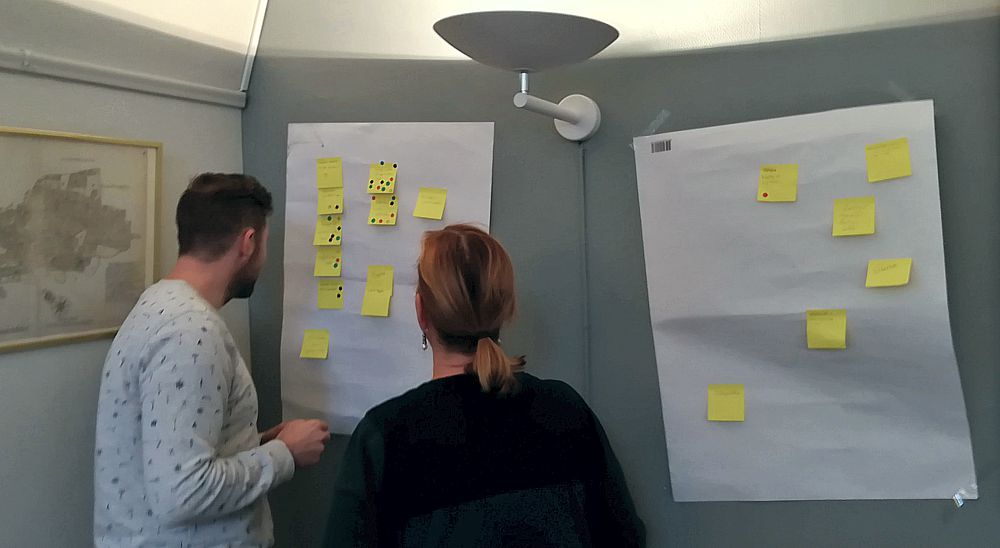
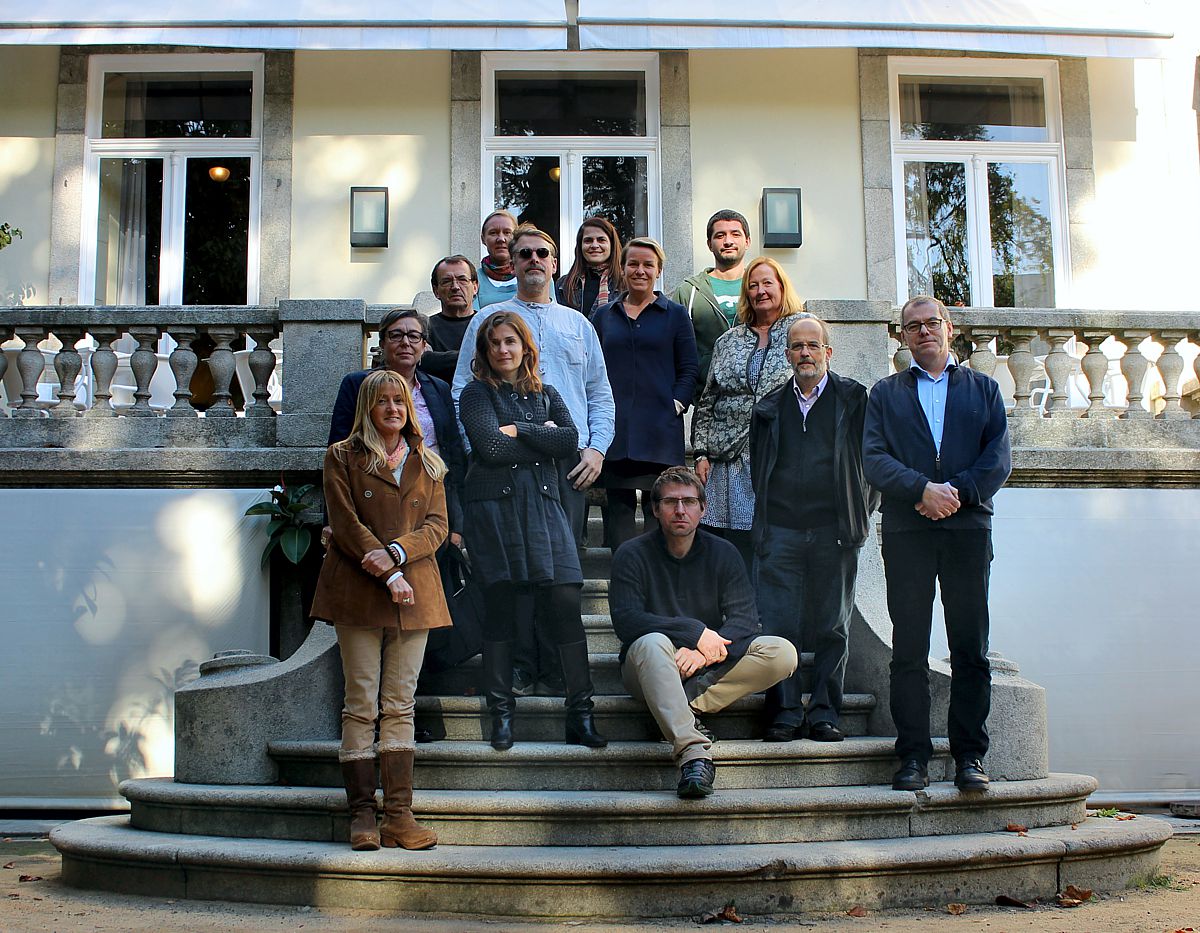
7-8 November 2017, the consortium gathered for the first time, during the CitizenSensing kick-off meeting. The meeting was held in Clube Universitário do Porto in Portugal. Apart from the tasks to be accomplished in particular work packages in the first phase of the project, a detailed agenda regarding the design and development of the Participatory Risk Management System (PRMS) was established. Moreover, some information about the sensors deployed in Porto was provided to the consortium members by the local authority officers.
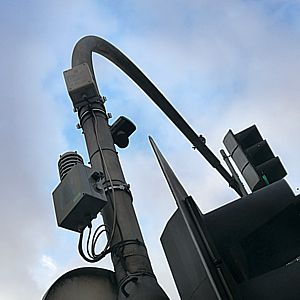 Picture of a sensor station in the streets of Porto [map]. The unit is equiped with for example a camera to
measure the number of people crossing the street, a microphone to measure the noise
pollution, thermometer and other components. It is connected via the city-wide
municipal wifi. It is powered by a separate 220-V outlet provided by the
municipality.
Picture of a sensor station in the streets of Porto [map]. The unit is equiped with for example a camera to
measure the number of people crossing the street, a microphone to measure the noise
pollution, thermometer and other components. It is connected via the city-wide
municipal wifi. It is powered by a separate 220-V outlet provided by the
municipality.
A total budget of about 63 Mio € was allocated for the call to support 3-year
research projects. Among the 54 pre-proposals submitted for topic A "Advanced
co-development with users", and 12 proposals for topic B "Institutional integration
between 30 predetermined Research Performing Organisations (RPOs)", in total 26
projects were selected. Our CitizenSensing project was amongst those from topic
A...
Let's begin, then!